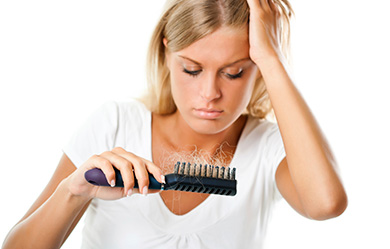If your clients are seeking treatments for dry, flaky skin, brittle nails or hair that has become thin or coarse, or perhaps because they are gaining weight despite having a decreased appetite, the problem may well be systemic, such as a dysfunctioning thyroid – underactive (hypothyroidism) or overactive (hyperthyroidism).
Hypothyroidism is especially common in women. Between ages 35 and 65, about 13 percent of women will have it, and the proportion rises to 20 percent among those over 65.
 Because the link between symptoms and thyroid disease isn’t always obvious, many women won’t know they have it and so aren’t getting the treatment they need. Thus the skin, hair or nail treatments you are offering them won’t be achieving the desired results.
Because the link between symptoms and thyroid disease isn’t always obvious, many women won’t know they have it and so aren’t getting the treatment they need. Thus the skin, hair or nail treatments you are offering them won’t be achieving the desired results.
When you see clients on a regular basis and start noting a pattern of symptoms such as these, you could suggest they get a medical check-up to have their thyroid assessed.
The thyroid is a large ductless butterfly-shaped gland in the neck which secretes hormones regulating growth and development through the rate of metabolism. It often suffers due to excess stress and nutrient-deficient food, with almost 500,000 Australians dealing with long-term thyroid disorders.

‘Our thyroids have been really affected in recent times thanks to lack of iodine and selenium in the soil, nutrient-deficient, highly processed foods, man-made chemicals and stress,’ says Janella Purcell, naturopath, nutritionist and Lifestream wholefoods ambassador.
‘When it is not functioning properly, our overall health suffers but there are steps we can take to help foster healthy, balanced thyroid function.’
For those who suffer from a thyroid condition, there are some simple healthy habits that can be adopted, says Janella, under the supervision of a health professional. Why not pass this information on to your clients – and you and your staff may also benefit!
TOP UP WITH SELENIUM
The main food sources of selenium in Australia are meat, poultry and game products; cereal products, fish and seafood. However soil concentration of selenium varies widely and affects levels in plant food.
Australian soils are known to be selenium deficient, therefore our food is often lacking this essential trace element.
Selenium is necessary for antioxidant protection and optimum immune and thyroid metabolism. I recommend Lifestream Natural Selenium, a wholefood source, cultured from selenium rich yeast that is 100 percent organically bound. High selenium yeast has emerged in recent times as the preferred option for selenium supplementation because it is natural and contains a wide range of organically bound selenium-rich proteins.
According to a 2014 Australian Health Survey, three percent of males and six percent of females aged two years and over did not meet their requirements for selenium intake.
Among those 71 years and over, approximately one in 10 had inadequate selenium intakes (12 percent of males and 10 percent of females).
It’s important to note that selenium may be toxic in high doses. Adults should take no more than 150mcg of selenium supplementation daily. Check with your health practitioner if you’re unsure.
SUPPLEMENT WITH A WHOLEFOOD IODINE SOURCE
Iodine is an essential nutrient required for the production of thyroid hormones, which is important for normal growth and development – especially the brain. Add Lifestream Bioactive Spirulina, sea veggies, Himalayan salt, cranberries, organic yoghurt, navy beans, potatoes and strawberries to your daily diet under the guidance of a health professional if on thyroid medication.
DRINK LOTS OF CLEAN, ALKALINE WATER DAILY
Water helps your metabolism function more efficiently, and can help reduce your appetite, reduce water retention and bloating, improve your digestion and elimination, and combat constipation. If the taste of plain water doesn’t appeal, add a squeeze of cleansing, vitamin C-rich lemon.
CHOOSE ORGANIC, FERMENTED SOY OVER PROCESSED SOY
Limit overconsumption of soy, especially processed and high-phytoestrogen forms of soy, like shakes, powders, soy milk and bars. Soy both acts as a goitrogen, and inhibits thyroid hormone absorption. You can either eliminate soy altogether, or limit it to organic fermented forms, like tempeh, in small quantities and not as a primary protein replacement. Non-organic soy is likely to be grown from genetically modified seed and sprayed with pesticides.
LIMIT GOITROGEN FOODS (particularly for overactive thyroids; ie. hyperthyroidism)
These are naturally-occurring substances in certain foods that can cause the thyroid gland to enlarge, which is called a goiter. Goitrogenic foods can also function like an anti-thyroid drug and actually slow down the thyroid and make it underactive.
If you are hypothyroid, you don’t need to avoid goitrogenic foods entirely. The enzymes involved in the formation of goitrogenic materials in plants can be at least partially destroyed by heat, allowing you to enjoy these foods in moderation if they are steamed or cooked. These are broccoli, cauliflower, brussels sprouts, cabbage, kohl rabi, turnip, kale and soy.




